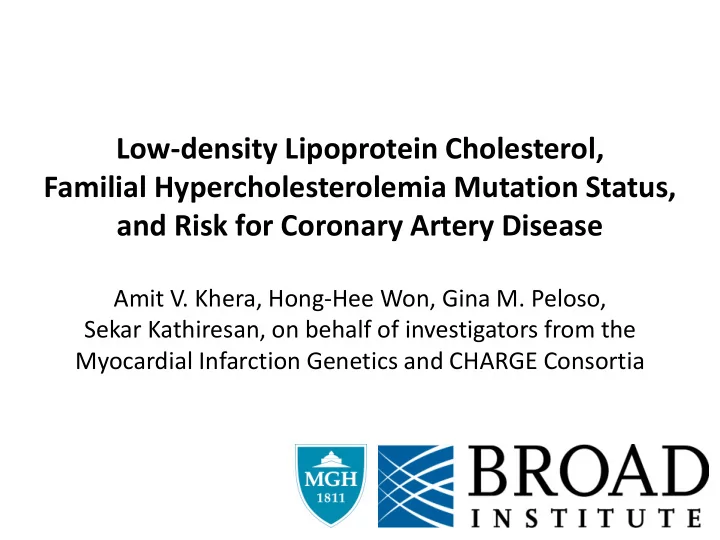

Low-density Lipoprotein Cholesterol, Familial Hypercholesterolemia Mutation Status, and Risk for Coronary Artery Disease Amit V. Khera, Hong-Hee Won, Gina M. Peloso, Sekar Kathiresan, on behalf of investigators from the Myocardial Infarction Genetics and CHARGE Consortia
Background: The Utility of Genetic Testing in Severe Hypercholesterolemia (LDL ≥ 190 mg/dl) is Uncertain Study Objectives: 1. Diagnostic Yield What proportion of individuals with LDL ≥ 190 have a FH mutation? LDL ≥ 190 mg/ dl 7% US Population 2. Clinical Importance For any given LDL, does LDL Cholesterol coronary risk vary Monogenic (FH) according to FH Polygenic mutation status? Environmental
Diagnostic Yield: Fewer than 2% of Individuals with LDL ≥ 190 mg/dl have an Identifiable FH Mutation Severe Hypercholesterolemia FH Mutation Positive LDL Cholesterol ≥ 190 24 of 1,386 (1.7%) 1,386 of 20,485 (7%)
Clinical Importance: CAD Risk is Substantially Higher in FH Mutation Carriers with LDL ≥ 190 OR� for� CAD� � (95%CI)� LDL� ≥ � 190� mg/dl� � � 6.0� FH� Mutation� – � (N� =� 1,264)� (5.2� – � 6.9)� 22.3� FH� Mutation� +� (N� =� 73)� (10.7� – � 53.2)� LDL� <� 130� &� FH� Mutation� – � � Reference� Logistic Regression in Myocardial Infarction Genetics Consortium Studies Covariates: Gender, Study, 5 principal components of ancestry
Potential Mechanism: FH Mutation Carriers have Higher Cumulative Exposure to LDL Cholesterol Mean LDL 195 mg/dl Δ = 18 mg/dl Mean LDL 196 mg/dl
Summary 1. Diagnostic Yield Only about 2% of individuals with LDL ≥ 190 have a FH mutation; remainder likely related to polygenic or environmental causes. 2. Clinical Importance For any given LDL, risk of coronary artery disease is substantially higher among those with a FH mutation, likely due to increased lifelong exposure to circulating LDL. Additional Details Available in Online Publication
Recommend
More recommend